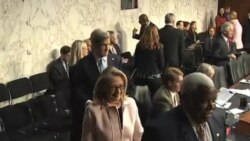WASHINGTON —
President Barack Obama is eagerly awaiting Senate confirmation for several Cabinet nominees, including Chuck Hagel as defense secretary, Jack Lew as secretary of the treasury and John Kerry, who was approved Tuesday by a panel as the next secretary of state, with the full Senate to vote soon. The Senate confirmation process, however, often has become politicized.
Under the U.S. Constitution, the Senate has the power to advise and consent on nominations put before it by the president, including Cabinet nominees.
For much of U.S. history, senators generally deferred to the president’s wishes when it came to Cabinet or Supreme Court appointments. That began to change in the 1980’s, though, said American University presidential historian Allan Lichtman.
“Well traditionally, of course, presidents usually get their way with appointments, and that remains the rule. However, since the 1980’s, confirmations have become more bitter and more political,” said Lichtman.
Bruising battle
That trend began with the contentious 1987 battle over conservative Robert Bork’s nomination to the Supreme Court, which Senate Democrats defeated.
Former Senator John Tower was blocked as defense secretary two years later under the presidency of George H. W. Bush.
In 1991, Clarence Thomas was confirmed as a high court justice, but only after a divisive fight in the Senate.
In recent years, both parties have seen confirmation battles as fair game, said analyst John Fortier of the Bipartisan Policy Center.
“Before it was often thought that you would give the president the choice as long as it was within a certain range of acceptableness. Today, many, many people from the opposition party oppose a lot of nominations,” said Fortier.
Partisan politics
Historian Lichtman said the increasingly contentious nature of confirmation battles in the Senate is another example of the sharply divided political age in which we live.
“We have now in America what I call the 'perpetual campaign.' There seems to be no deference to a president or to presidential appointments even in-between elections. We are always campaigning and if a nominee looks like a convenient target, why not?” asks Lichtman.
Fortier said the next major confirmation battle could come if and when Obama has an opportunity to fill a vacancy on the Supreme Court. The high court remains sharply divided with five justices generally voting along conservative lines and the other four justices often supporting a more liberal view in cases.
“That will be the real battle, especially if it is a conservative justice retiring with the potential of being replaced by a more liberal justice. That is the type of confirmation battle that will raise to a top national issue,” he said.
In his first term, Obama won confirmation for two Supreme Court justices, Sonia Sotomayor and Elena Kagan. So far, though, none of the current justices has indicated any intention to retire.
Under the U.S. Constitution, the Senate has the power to advise and consent on nominations put before it by the president, including Cabinet nominees.
For much of U.S. history, senators generally deferred to the president’s wishes when it came to Cabinet or Supreme Court appointments. That began to change in the 1980’s, though, said American University presidential historian Allan Lichtman.
“Well traditionally, of course, presidents usually get their way with appointments, and that remains the rule. However, since the 1980’s, confirmations have become more bitter and more political,” said Lichtman.
Bruising battle
That trend began with the contentious 1987 battle over conservative Robert Bork’s nomination to the Supreme Court, which Senate Democrats defeated.
Former Senator John Tower was blocked as defense secretary two years later under the presidency of George H. W. Bush.
In 1991, Clarence Thomas was confirmed as a high court justice, but only after a divisive fight in the Senate.
In recent years, both parties have seen confirmation battles as fair game, said analyst John Fortier of the Bipartisan Policy Center.
“Before it was often thought that you would give the president the choice as long as it was within a certain range of acceptableness. Today, many, many people from the opposition party oppose a lot of nominations,” said Fortier.
Partisan politics
Historian Lichtman said the increasingly contentious nature of confirmation battles in the Senate is another example of the sharply divided political age in which we live.
“We have now in America what I call the 'perpetual campaign.' There seems to be no deference to a president or to presidential appointments even in-between elections. We are always campaigning and if a nominee looks like a convenient target, why not?” asks Lichtman.
Fortier said the next major confirmation battle could come if and when Obama has an opportunity to fill a vacancy on the Supreme Court. The high court remains sharply divided with five justices generally voting along conservative lines and the other four justices often supporting a more liberal view in cases.
“That will be the real battle, especially if it is a conservative justice retiring with the potential of being replaced by a more liberal justice. That is the type of confirmation battle that will raise to a top national issue,” he said.
In his first term, Obama won confirmation for two Supreme Court justices, Sonia Sotomayor and Elena Kagan. So far, though, none of the current justices has indicated any intention to retire.






